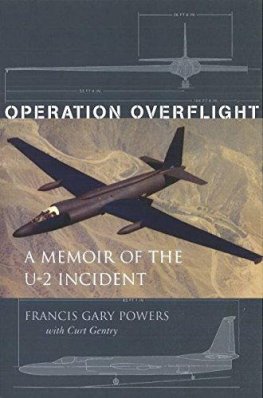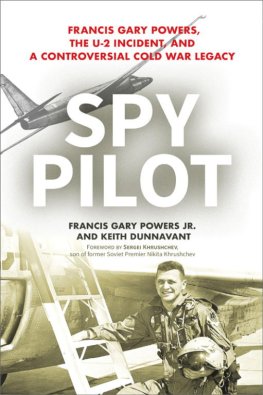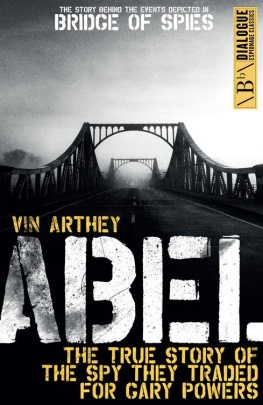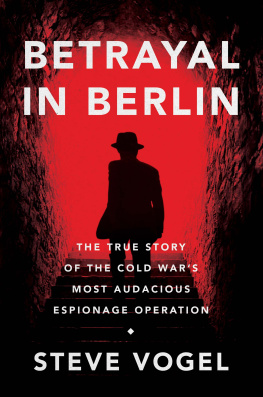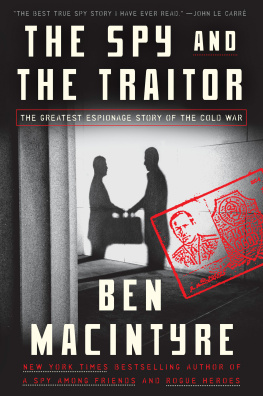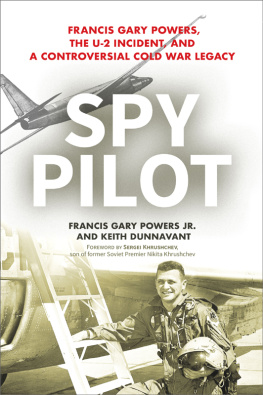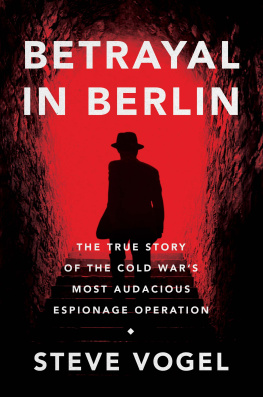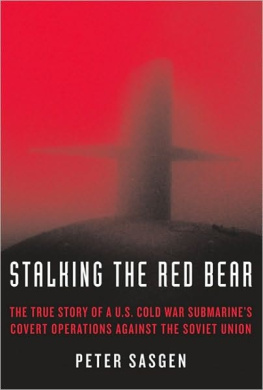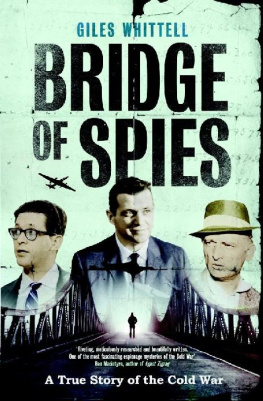Francis Gary Powers
with Curt Gentry
OPERATION OVERFLIGHT
A MEMOIR OF THE U-2 INCIDENT
To Sue, who provided the happy ending
To the memory of
Buster Eugene Edens
who died in the crash of a U-2
at Edwards Air Force Base, California
April 1965

On May 1, 1960the traditional May Day holidayan American U-2 spyplane flew high above the Soviet Union photographing strategic targets. It was the twenty-fourth U-2 mission over the USSR since the first overflight almost four years earlier. The pilot of this U-2 was thirty-year-old Francis Gary Powers. A former U.S. Air Force fighter pilot, Powers was the most experienced U-2 pilot in the spyplane program with about six hundred hours at the controls of a U-2. He was also one of the most respected spyplane pilots, for his airmanship and for his integrity.
The calm sky more than seventy thousand feet above the USSR, far above the altitude of any Soviet fighter, was suddenly ripped apart as a surface-to-air missile detonated near Powerss aircraft. Heavily damaged, the plane fell out of control. Unable to use his ejection seat, with great difficulty Powers bailed out of the crippled aircraft as it spun toward earth. He landed safely and was soon captured and flown to Moscow.
The shootdown of the U-2 piloted by Powers had a spectacular impact on the Cold War. In the late 1950s, the United States, under President Dwight D. Eisenhower, and the USSR, under Premier Nikita S. Khrushchev, had been moving toward closer relations. Following a successful summit meeting of the two superpower leaders in Geneva in July 1955, there was some thawing of the Cold War. Khrushchev visited the United States in September 1959, seeing Congress and Iowa cornfields and meeting stars on a Hollywood movie set. He invited Eisenhower, his children and grandchildren to visit the Soviet Union.
This superpower warming ended abruptly with the Powers shootdown. American cover stories about a weather reconnaissance plane straying off course were soon revealed to be boldfaced lies. Khrushchev himself went to New York to denounce the overflights at the United Nations. Powers was put on trial and found guilty of spying. Eisenhower, poorly served by the Central Intelligence Agency in the affair, personally took responsibility. The long-planned summit meeting in Paris in mid-May was a disaster as Khrushchev demanded an apology from the president.
The revelations that followed about the overflights were both a triumph and an embarrassment for the Soviet Union: One of the acclaimed American spyplanes had been shot down, but for almost four yearssince July 4, 1956the U-2s had overflown Soviet territory with impunity.
The twenty-three successful overflights had been vital to U.S. national security. Penetrating the iron curtain that had descended over the Soviet Union and its Eastern European satellite states, the U-2 provided explicit intelligence of the Soviet manned bomber program and then of its intercontinental ballistic missile program. Further, strategic targets that had been known only from German maps of the early 1940s and even older documentation could be located with accuracy.
In Operation Overflight, Francis Gary Powers provided un-equaled insights into the U-2 program, the training of U-2 pilots, and of spyplane missionsover the USSR as well as over the Middle East and even certain friendly countries. His descriptions are vivid and his writing style engrossing.
This book is a significant contribution to the history of aviation.
Norman PolmarAuthor,
Spyplane: The U-2 History DeclassifiedPROLOGUE
Turner Air Force Base, Albany, Georgia January, 1956
In the service you scan the bulletin board with one eye closed, hoping not to see your name, since its being there means one of two things. Youve fouled up in some way, and been caught at it. Or youve been assigned extra duties.
That afternoon I had returned to the base after a routine training flight in an F-84F jet fighter; passing the board, I spotted a new list. On it: Powers, Francis Gary lLt.
I was to report to a major in the wing headquarters building at 0800 hours the following morning. No reason given.
There was some consolation. Mine wasnt the only name. A number of other pilots were also listed.
Next morning we met outside the majors office a few minutes before eight. Wracking our collective brains, we couldnt come up with any unusual devilment, at least none of which we were all guilty.
The major came right to the point. Some men were interested in talking to us about a possible job offer.
Why us?
Because, he replied, we met certain qualifications: we had exceptional pilot ratings; were reserve officers with indefinite enlistments; had Top Secret clearances; plus having in excess of the required number of hours flight time in single-engine, single-place aircraft.
We all started to ask questions. The major interrupted. He was sorry, that was all he could tell us; except, if we were interested, when and where to report.
Later, over coffee, we tried to figure it out, agreeing only that it was a flying job. Everything else was decidedly odd.
The Air Force was not in the habit of arranging outside job interviews for its officers.
Even more puzzling, the meetings were to take place individually, at different times, not during duty hours but at night, not on base but at a motel outside Albany, the Radium Springs Inn on Radium Springs Road. In my case, at 1900 hours (seven p.m.) I was to go to cottage 1, knock, identify myself, and ask for a Mr. William Collins.
Cottage 1 was at the end of the row.
I knocked, feeling more curious than anything.
The man who opened the door was in his mid-thirties, of medium build, about five-feet-ten, with black hair, and, like the two men I could see in the room behind him, in civilian clothes.
I was told to ask for a Mr. William Collins, I said, feeling a trifle silly.
Im Bill Collins, he replied. You must be He paused and waited.
Lieutenant Powers.
Motioning me inside, he introduced me to the other men.
We shook hands and I took the chair they indicated.
Collins was apparently spokesman for the group.
I suppose youre wondering what this is all about?
I admitted I was.
Im afraid theres not very much I can tell you, at least at this time. What I can say is this. You, and several other pilots, have been picked to be part of an organization to carry out a special mission. It will be risky, but patriotic. Should you decide to join us, youll be doing something important for your country. The pay will be more than you are now receiving.
And thats about all I can tell you now. What wed like you to do is think about it overnight. Then, if youre still interested, call me here at the motel tomorrow; well arrange another meeting.
Despite the sketchiness of the information, everything Collins had said appealed greatly to my sense of adventure. There was no clue as to what the job would be, or for whom I would be working, but it sounded like a Flying Tiger-type operation, such as Chennault had organized in China prior to World War II. I was definitely interested, and told Collins so.
No, he said, dont decide now. Think about it overnight. Oh, one more thing. Youll be overseas for eighteen months, and you cant take your family along.
I had been married just nine months, and the marriage had been troubled. I was not at all sure it could survive a long separation.

